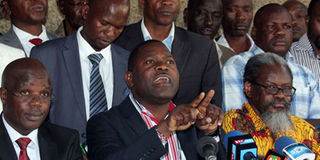Lecturers’ strike a fight to reclaim intellectual dignity

Sitting, from right: Constantine Wasonga, the secretary-general of the Universities Academic Staff Union (UASU), Charles Mukhwaya, the secretary-general of the Kenya Universities Staff Union and Muga K'olale, the chairman of UASU, at Chester House in Nairobi on January 12, 2017. PHOTO | DENNIS ONSONGO | NATION MEDIA GROUP
What you need to know:
The nonchalance with which the government is treating the dons’ strike reflects its persistent anti-intellectual pose.
The casualness with which this country treats its intellectuals is disturbing and must be resisted.
The struggle of the lecturers is not merely about pay.
The government must honour the 2013 CBA to restore and safeguard the long lost dignity of the academe.
In the final weeks of my doctoral studies, I was brimming with excitement and expectancy. I would be coming back home to Kenya after four years in wintry Europe. It was time to give back to a country that had heavily invested in me. I had been in continuous schooling for 27 years and I could not wait to drop the “student” tag.
I was under no illusions as to the many challenges that the average lecturer in a university faced. Still, I held onto an abiding hope that those to whom the responsibility of production and dissemination of knowledge at the highest institutions of learning is given, deserved, at the very least, some dignity. Once in Kenya and settled in a lectureship job, I routinely laughed off remarks that we, dons, held big names and no wherewithal to accompany it. That though titled, we carry empty pockets.
It was 2013. The Jubilee administration had just assumed power. The first order of parliamentary business, I recall, was debate on the remuneration of parliamentarians. An assault on the Salaries and Remuneration Commission was launched, laced with blackmail and threats, which saw the parliamentarians cart away millions of shillings in salaries and allowances. One needs only an Ordinary Level certificate to be an MP. But the most anti-intellectual political establishment since Kenya’s independence was not done yet. In a moment of madness, MCAs had their salaries and allowances multiplied, with the least paid earning thrice as much as a university professor. While it takes decades of toil to produce a professor, one only needs to show proof that they sat – and not necessarily passed – a Standard Eight exam. The Kenyan taxpayer now coughs up more than Sh100 billion every year to support the easy lifestyles of over 2,200 MCAs and over 400 members of Parliament.
PERMANENT SECRETARY
In the 1980s, the salary of a Permanent Secretary was a little lower than that of a university professor. An MP earned far much less than a professor. The logic was simple; those who trained and produced both the private and public service through teaching and research deserved a decent pay. It was the only way the dignity of the academe was secured.
Over time, while the salaries of the professors stagnated, and only moved slightly after protracted disputes with the government, the pay of government officials and MPs has ballooned. An MP with little more than a high school education and some random literacy now earns 10 times more than a professor. There is something morally wrong with this state of affairs.
In the few years that I have worked in university I have seen some of Kenya’s best brains resign to take up roles as MCAs. Due to poor pay, county governments have overtaken overseas universities as the leading sources of the “brain drain”. This, too, is unacceptable.
University lecturers have been on strike since the first week of January. In less dysfunctional democracies, the possibility of an academic calendar being disrupted for this long would not be allowed. The nonchalance with which the government is treating the dons’ strike reflects its persistent anti-intellectual pose. It was equally troubling to read a columnist in this paper argue that the lecturers strike is “strange” and that unlike hospitals, Kenya can as well shut universities. The casualness with which this country treats its intellectuals is disturbing and must be resisted.
BARGAINING AGREEMENT
Kenya’s long-suffering dons are asking for a 2013 collective bargaining agreement (CBA) to be signed and registered before it expires in a few months.
This should have been finalised almost four years ago but the government has been keen to dodge responsibility. On getting the strike notice, the government gave a counter offer that reflected the disdain with which it regards its dons. An outrageously laughable three per cent salary increase was tabled, which translates to about a Sh1,000 pay increase for all the categories of lecturers.
To protect their dignity, the dons turned down the offer. The struggle of the lecturers is not merely about pay. The government must honour the 2013 CBA to restore and safeguard the long-lost dignity of the academe.
Dr Duncan Omanga is lecturer of media studies, Moi University.




